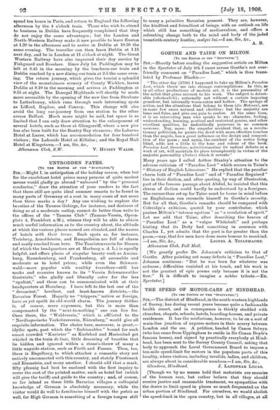GOETHE AND TAINE ON MILTON.
[To THE EDITOR OF THE "SPECTATOR."] SIR,—Sbortly before reading the suggestive article on Milton in the Spectator of July 4th I came across Goethe's not over- friendly comment on "Paradise Lost," which is thus trans- lated by Professor Blackie:— " The other day (1799) I happened to take up Milton's Paradise Lost, which threw me into strange contemplations. In this, as in all other productions of modern art, it is the personality of the artist that gives interest to his work. The subject is detest- able (abscheulielt); externally not without a certain imposing grandeur, but internally worm-eaten and hollow. The springs of action, aud the situations that belong to them (die Mottven), are in some few cases natural and effective; but the majority are lame and false, and give one pain to realise. At the same time, it is an interesting man who speaks to us : character, feeling, understanding, learning, poetical and oratorical genius, and other excellent qualities, he undoubtedly possesses in no common measure. Nay, more: the singular accident that, as a revolu- tionary politician, he paints the devil with more effective touches than the angels, has a great influence on the design and composi- tion of the poem ; and again, the accident of the writer being blind, adds not a little to the tone and colour of the book. Paradise Lost, therefore, notwithstanding its radical defects as a work of art, will maintain its place triumphantly in virtue of the majestic personality (Natur) which it reveals."
Many years ago I called Arthur Stanley's attention to the adverse criticism of "Paradise Lost" which occurs in Taine's "History of English Literature." He replied that the peculiar charm both of "Paradise Lost" and of "Paradise Regained" lies in their diction, and after quoting, by way of illustration, part of the famous passage about Abdiel, he insisted that this charm of diction could hardly be understood by a foreigner. The excuse thus set up for Taine must be borne in mind before an Englishman can reconcile himself to Goethe's severity. But for all that, Goethe's remarks should be compared with Coleridge's criticism, quoted by your contributor, which praises Milton's "intense egotism" as "a revelation of spirit." Let me add that Taine, after describing the heaven of "Paradise Lost" as a "vulgar Whitehall," and perhaps hinting that its Deity had something in common with Charles I., yet admits that the poet is far greater than the poem,—nay, that few men have done more honour to mankind.
[We greatly prefer Dr. Johnson's criticism to that of Goethe. After pointing out many defects in "Paradise Lost," Johnson continues : "But he was born for whatever was arduous ; difficulties vanished at his touch, and his work is
not the greatest of epic poems only because it is not the first." It is difficult to imagine a nobler tribute.—En.
Spectator.]






































 Previous page
Previous page